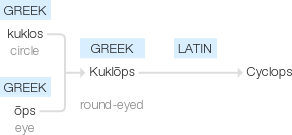Cyclops
via Latin from Greek Kuklōps, literally ‘round-eyed’, from kuklos ‘circle’ + ōps ‘eye’.
wiktionary
Borrowed from Latin cyclops, from Ancient Greek Κύκλωψ(Kúklōps, “Cyclops”), q.v.
etymonline
Cyclops (n.)
(plural Cyclopes), in Greek mythology, a giant with one eye, circular and in the middle of the forehead, 1510s, from Latin Cyclops, from Greek kyklops, literally "round-eyed," from stem of kyklos "circle, circular body" (from PIE root *kwel- (1) "revolve, move round") + ops "eye" (from PIE root *okw- "to see").
According to the Hesiodic legend, there were three Cyclopes of the race of Titans, sons of Uranus and Ge, who forged the thunderbolts of Zeus, Pluto's helmet, and Poseidon's trident, and were considered the primeval patrons of all smiths. Their workshops were afterward said to be under Mount Etna. [Century Dictionary]
But in the Odyssey they were lawless gigantic cannibal shepherds in Sicily under their chief Polyphemus, and in other ancient tales they were race of giants from Thrace under a king Cyclops, who built the prehistoric walls and fortresses of Greece. Related: Cyclopic.
